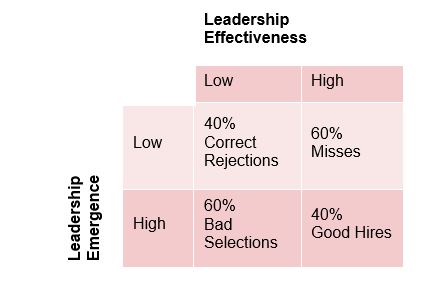
*This article was originally published by Training Industry on May 1, 2018.
One of the best studies ever conducted on organizational effectiveness was done by Jim Collins and described in his book “Good to Great.” Collins identified 11 firms from the Fortune 1000 that had 15 years of below-average performance in their industry followed by 15 years of above-average performance. The key question of the investigation is, what took these 11 firms from “good” to “great”?
Collins ultimately concluded (somewhat reluctantly) that the key driver of change in organizational performance was a change in leadership. However, simply changing the leadership was not enough. Collins found that these 11 high-performing firms chose leaders with an almost paradoxical blend of characteristics: They were fiercely competitive, yet personally humble.
It is easy to understand why leaders who are fiercely competitive are more effective: They want to beat the competition. What is less clear is why humility – as opposed to confidence, charm and charisma – was characteristic of the most effective leaders. This article draws on recent research in personality science to offer three generalizations about humility, leadership and organizational effectiveness.
Generalization #1: Humble Leaders Are More Effective.
In a systematic series of studies, Bradley Owens demonstrated that employees working for humble leaders are more engaged, satisfied and productive and better organizational citizens. That is, they talk up the organization to others, building a positive reputation for their organization. Additionally, organizations with humble leaders suffer from less turnover and are themselves more collectively humble.
So, what is it that humble leaders do to create such positive results? At least three things: First, humble leaders give credit to their team members and let everyone share in the team’s success. Doing so builds trust among the team. If subordinates do not trust their leader, the mission is doomed to failure. Humble leaders build trust.
Second, humble leaders recognize their own shortcomings and are willing to ask for help when a problem is outside of their area of expertise. Because team members trust humble leaders, they are happy to help when their leader asks.
Third, humble leaders are coachable. They listen to feedback from others and use it to improve their own performance. Leaders who lack humility cannot get better, because they ignore feedback.
Generalization #2: Humble Leaders Are Overlooked.
Unfortunately, modern organizations often overlook their most effective (humble) leaders. Charisma, charm and self-proclamations of competence are strong predictors of leadership emergence (i.e., being chosen to lead), despite their lack of association with leadership effectiveness (i.e., building a winning team). Because humble leaders give credit to others and avoid the spotlight, senior leadership often overlooks and underestimates their accomplishments.
Our own data show that ambition (i.e., the tendency to take charge, compete and advance one’s career) is slightly negatively correlated with humility. In other words, one of the key factors associated with leadership emergence (ambition) is negatively correlated with a key factor of leadership effectiveness (humility). The grid below illustrates the situation:

As shown, if leaders are selected for their emergence characteristics (i.e., high emergence), the probability of choosing an ineffective leader is 60 percent! This is precisely why Collins referred to the 11 most effective leaders as holding a paradoxical combination of traits. A small fraction of leaders possess both ambition and humility.
Generalization #3: Lack of Humility Ruins Organizations.
Most businesses ultimately fail, and the primary cause of organizational failure is poor leadership. There are many ways that leadership can go wrong, but four themes – all related to a lack of humility – are readily apparent. The first theme of poor management is an exaggerated sense of self and entitlement. Such narcissists obviously lack humility but are quite adept at getting themselves into leadership positions (see generalization #2). Ultimately, these leaders alienate their staff because they make promises that they cannot keep, they take credit for all successes, and they blame anyone and everyone else for any failures. Talented employees quit or find themselves on the proverbial chopping block. When talent leaves, organizations fail.
The second theme of poor management is a lack of awareness about how one’s actions are affecting others. These leaders are insensitive to the “people side” of doing business. Further, they fail to recognize this insensitivity as a shortcoming. Subordinates see them as cold and uncaring. While humble leaders are open to listening to what other people feel and think, insensitive leaders are unwilling to listen to opinions and feedback from others.
The third theme of poor management is an exaggerated need for social support and approval. All people have some need for social support and approval, but some really poor leaders are desperate for it (think Michael Scott from “The Office”). Similarly, the fourth theme of poor management is insecurity and low self-confidence. Both of these traits are rooted in insecurity and fear of rejection. Leaders who lack humility are desperate for attention and approval of others. Indeed, much of their expressed arrogance and overconfidence is intended to mask a deep desire for the approval of others. On the flip side, however, people who are overly humble may also suffer from such insecurities. For example, agreeing with the statement “I’m not very good at things” may reflect either true humility or a lack of self-confidence. Leaders who are appropriately humble are seen as confident and suffer from neither diffidence nor arrogance.
Leaders are the most consequential members of any organization. Unfortunately, the current cultural attraction to leaders who are charming, charismatic and self-promoting (e.g., transformational leadership) is leading us in the wrong direction. Some of our most effective leaders are hiding in our organizations, masked by their own humility. For the future success of our organizations, finding them is critical.


